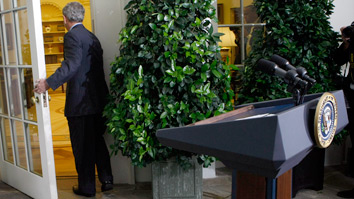Complete Story from senate
NEW YORK (CNNMoney.com) -- The Senate on Wednesday night passed a sweeping and controversial financial bailout similar in key ways to one rejected by the House just two days earlier.
The measure was passed by a vote of 74 to 25 after more than three hours of floor debate in the Senate. Presidential candidates Sens. Barack Obama, D-Illinois, and John McCain, R-Arizona, voted in favor.
Like the bill the House rejected, the core of the Senate bill is the Bush administration's plan to buy up to $700 billion of troubled assets from financial institutions.
Those assets, mostly mortgage-related, have caused a crisis of confidence in the credit markets. A major aim of the plan is to free up banks to start lending again once their balance sheets are cleared of toxic holdings.
But the Senate legislation also includes a number of new provisions aimed at Main Street.
The changes are intended to attract more votes in the House, in particular from House Republicans, two-thirds of whom voted against the bailout plan.
The House is expected to take up the Senate measure for a vote on Friday, according to aides to Democratic leaders.
The legislation, if passed by the House, would usher in one of the most far-reaching interventions in the economy since the Great Depression.
Advocates say the plan is crucial to government efforts to attack a credit crisis that threatens the economy and would free up banks to lend more. Opponents say it rewards bad decisions by Wall Street, puts taxpayers at risk and fails to address the real economic problems facing Americans.
"If we do not act responsibly today, we risk a crisis in which senior citizens across America will lose their retirement savings, small businesses won't make payroll ... and families won't be able to obtain mortgages for their homes or cars," said Senate Majority Leader Harry Reid, D-Nev., moments before the vote.
In a press briefing after the vote, Senate Minority Leader Mitch McConnell. R-Ky., said, "This is a measure for Main Street, not Wall Street. [It will help> to unfreeze our credit markets and get the American economy working again."
Because of Senate add-ons, the bill's initial price tag will be higher than the $700 billion that the Treasury would use to buy troubled assets. But over time, supporters say, taxpayers are likely to make back much if not all of the money the Treasury uses because it will be investing in assets with underlying value.
How the Senate bill differs
The package adds provisions to the House version - including temporarily raising the FDIC insurance cap to $250,000 from $100,000. It says the FDIC may not charge member banks more to cover the increase in coverage. But that doesn't prevent the agency from raising premiums to cover existing concerns with the insurance fund, according to Jaret Seiberg, a financial services analyst at the Stanford Group, a policy research firm.
Instead, the bill allows the FDIC to borrow from the Treasury to cover any losses that might occur as a result of the higher insurance limit.
The bill also adds in three key elements designed to attract House Republican votes - particularly popular tax measures that have garnered bipartisan support.
It would extend a number of renewable energy tax breaks for individuals and businesses, including a deduction for the purchase of solar panels.
The Senate bill would also continue a host of other expiring tax breaks. Among them: the research and development credit for businesses and the credit that allows individuals to deduct state and local sales taxes on their federal returns.
In addition, the bill includes relief for another year from the Alternative Minimum Tax, without which millions of Americans would have to pay the so-called "income tax for the wealthy."
The debate over extending AMT relief is an annual political ritual. It enjoys bipartisan support but deficit hawks on both sides of the aisle contend the cost of providing that relief should be paid for. Others argue it shouldn't be paid for because the AMT was never intended to hit the people the relief provisions would protect. Nevertheless, lawmakers pass the measure every year or two.
How Senate bill mimics House version
For all the sweeteners added to the Senate bill, however, it is similar to the House bill in many key ways.
The core is the Treasury's proposal to let financial institutions sell to the government their troubled assets, mostly mortgage-related. And as in the House bill, the Senate would only allow the Treasury access to the $700 billion in stages, with $250 billion being made available immediately.
The Senate bill is also similar in that it includes a number of provisions that supporters say would protect taxpayers. One would direct the president to propose a bill requiring the financial industry to reimburse taxpayers for any net losses from the program after five years. And the Treasury would be allowed to take ownership stakes in participating companies.
Like the House version, the Senate bill includes a stipulation that the Treasury set up an insurance program - to be funded with risk-based premiums paid by the industry - to guarantee companies' troubled assets, including mortgage-backed securities, purchased before March 14, 2008.
And it would place curbs on executive pay for companies selling assets or buying insurance from Uncle Sam. One provision: Any bonus or incentive paid to a senior executive officer for targets met would have to be repaid if it's later proven that earnings or profit statements were inaccurate.
Lastly, the Senate version would set up two oversight committees. A Financial Stability Board would include the Federal Reserve chairman, the Securities and Exchange Commission chairman, the Federal Home Finance Agency director, the Housing and Urban Development secretary and the Treasury secretary.
A congressional oversight panel, to which the Financial Stability Board would report, would have five members appointed by House and Senate leadership from both parties.
Differing views
Despite the Senate bill's sweeteners, the bill did not garner unanimous support because those who oppose the Treasury plan felt passionately it was the wrong approach.
Sen. Maria Cantwell, D-Wash., a champion of the energy tax breaks in the bill, said on Wednesday afternoon she nevertheless would vote against the bill because she opposes "giving the keys to the Treasury over to the private sector."
Opponents of the bill have said they resented being given a "my way or the highway" choice to address what they acknowledge is a very serious economic threat.
During the Senate debate on Wednesday, Sen. David Vitter, R-La., characterized the administration's request to lawmakers 12 days ago as "crying 'Fire!' in a crowded theater, then claiming the only [way out> is to tear down the walls when there are many exit doors."
Sen. Richard Shelby, R-Ala., said the Senate will have "failed the American people" by acting hastily. "I agree we need to do something. ... [But> we haven't spent any time figuring out whether we've picked the best choice."
Supporters of the bill say they hate the position they are in and are angry, too, but say it's better to do something now than to let the credit crunch persist.
"There's no doubt that there may be other plans out there that, had we had two or three or six months to develop ... might serve our purposes better," said Obama during the floor debate. "But we don't have that kind of time. And we can't afford to take a risk that the economy of the United States of America and, as a consequence, the worldwide economy could be plunged into a very, very deep hole."
Potential costs
The tax provisions of the Senate bill - the bulk of which come from the addition of tax breaks from other legislation - may reduce federal tax revenue by $110 billion over 10 years, according to estimates from the Joint Committee on Taxation. More than half of that is due to the 1-year extension of AMT relief.
The Congressional Budget Office said it cannot estimate the net budget effects of the troubled asset program because of the many unknowns about that piece of the bill.
However, the agency noted in a letter to lawmakers on Wednesday, it expects the program "would entail some net budget cost" but that it would be "substantially smaller than $700 billion."
Overall, the CBO said, "the bill as a whole would increase the budget deficit over the next decade."
All eyes on House
Now the fate of the bailout rests with the House.
"The reality has hit some members," said House Financial Services Chairman Barney Frank, D-Mass., late Wednesday on CNN. "The main change is reality - it's not possible now to scoff at the predictions of doom if we don't do anything."
The lead House Republican, Rep. John Boehner, R-Ohio, was consulted on the Senate's plans and gave his "green light," spokesman Kevin Smith said. "We believe we'll have a better chance to pass this bill than the one that failed [Monday>," he added.
The plan could attract House Republicans while simultaneously alienating bailout supporters among the Democrats because the tax cuts in the revenue bill aren't offset by spending cuts or increased revenues.
President Bush, following the Senate vote, said the bill was central to the "financial security" of the nation. "The American people expect - and our economy demands - that the House pass this good bill this week and send it to my desk."
Posted on 10/3/2008 2:15:47 AM


